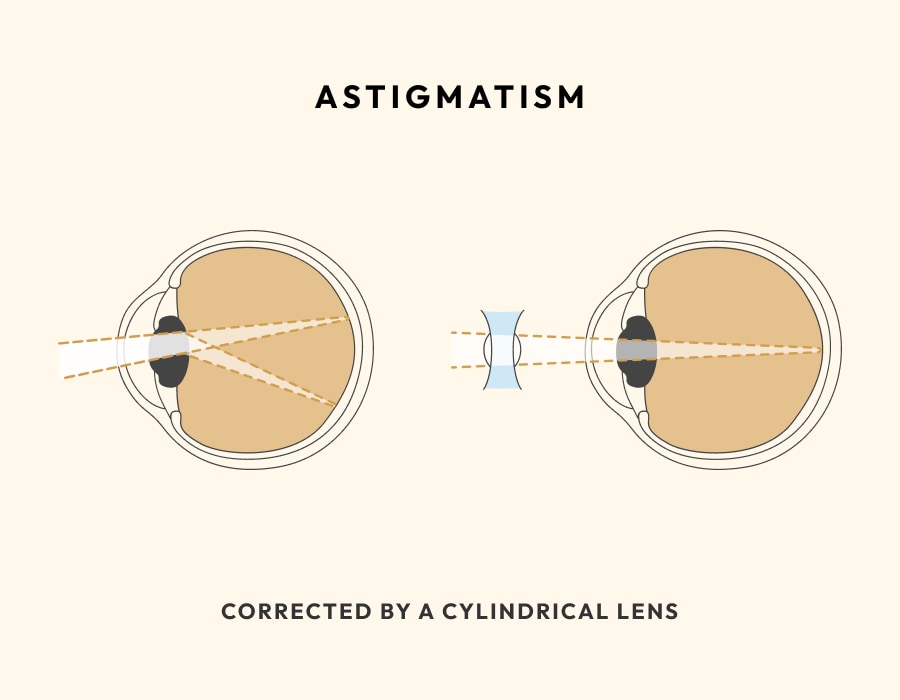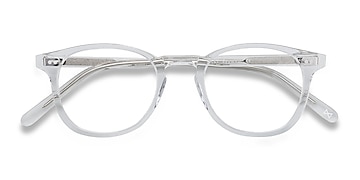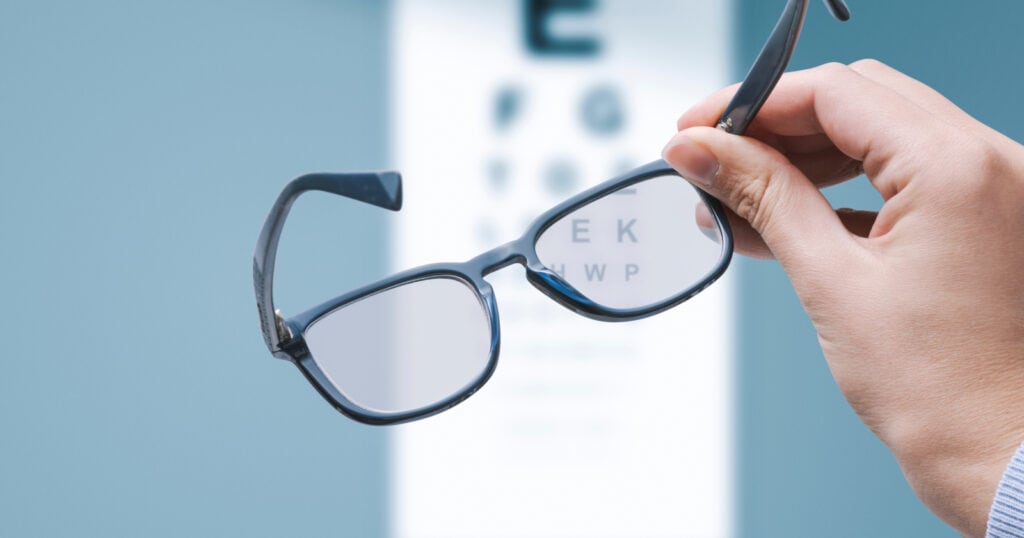Reviewed by Sonia Kelley, OD, MS on June 21, 2023
If you’ve been told you need prescription eyeglasses to correct astigmatism, you may be wondering what makes glasses for astigmatism different from other types of eyewear. Read on to learn about this common refractive error and if it’s time for you to get astigmatism glasses.
What Is Astigmatism?
Astigmatisms are caused by imperfections in the curvature of the eye’s cornea. Rather than seeing complete blurriness at certain distances, people with astigmatisms see hazy or blotched spots in an otherwise clear image. The most common vision related issues people experience are nearsightedness, farsightedness, and astigmatisms. All three are the result of light not being properly received into the eye. When a person ages, their eyeballs eventually get longer. Nearsightedness and farsightedness are the result of these elongations in the eyeball. When this happens, incoming light begins to have trouble focusing into the retina, causing near or far away images to appear blurry.

Understanding Your Astigmatism Correction Prescription
Astigmatism is a vision condition that causes you to have blurry or distorted vision when looking at things up close, far away, or both.
Astigmatism is commonly caused by imperfections in the shape of the cornea. Normally, the cornea is round like a basketball. But with astigmatism, the cornea has an uneven curvature that is more similar to a football.
This means that when light enters your eye, the cornea can’t bend light correctly to focus it directly onto your retina. Instead, light is focused at different points inside your eye, which makes your vision blurry up close and far away. Astigmatism can also result from irregularities in the shape of the lens, but the cornea is the more common cause.
Astigmatism is usually hereditary, which means you can inherit it from your parents and you can pass it down to your kids.
Do I Need Glasses for Astigmatism?
You might not need eyeglasses if you have mild astigmatism and can see clearly without any problems. But if your astigmatism is more pronounced and it does affect your eyesight, wearing prescription glasses may help you see more clearly.
Can Glasses Fix Astigmatism?
While they don’t technically “fix” astigmatism, prescription glasses can correct astigmatism and give you clear vision while you wear them. The corrective lenses ensure that the light entering each of your eyes is focused on the retina.
It’s common for people with astigmatism to also have nearsightedness (myopia) or farsightedness (hyperopia). If you have one of these refractive errors along with astigmatism, your glasses will correct this too.
Understanding Your Astigmatism Correction Prescription
If you get a vision prescription from your eye doctor to correct your astigmatism, here’s what some of the numbers mean:
- Cylinder (CYL) – The lenses in your glasses need to have the right power to correct your astigmatism. The cylinder value is the power needed to correct your astigmatism.
- Axis – The axis value indicates the orientation of the cylinder power within the lens.
- Sphere (SPH) – The sphere value is the degree of correction needed to correct nearsightedness (a number with a minus sign) or farsightedness (a number with a plus sign) if you also have one of these vision problems.
How Do I Know If I Need Glasses for Astigmatism?
People with astigmatism often experience the following symptoms:
- Vision that is blurred
- Areas of warped or distorted vision
- Needing to squint to bring objects into focus
- Eye strain, including tired and/or heavy eyes
- Headaches
- Pain in the eyes
- Difficulty seeing at night
Having these symptoms doesn’t necessarily mean you have astigmatism. But if you do experience any sudden or ongoing vision problems, it’s a good idea to make an appointment with your eye doctor for a comprehensive eye exam.
Symmetry, in Translucent
What Are the Best Glasses for Astigmatism?
If your eye doctor recommends that you wear glasses to correct your astigmatism, how do you know what kind to get? Here are some things to consider when choosing glasses:
Lens Type
If your glasses are prescribed to correct astigmatism only, single-vision lenses are a good choice. They correct for one distance across the entire surface of the lens.
If you also have presbyopia (an age-related loss of near focusing ability), ask your eye doctor about progressive lenses. These lenses can help you see clearly at all distances.
Lens Features
You may also consider the following lens coating and technology options when ordering glasses for astigmatism:
- Anti-reflective (AR) coating – AR coating helps eliminate reflections from the front and back surfaces of your lenses. This allows more light to pass through your glasses, which in turn helps you to see better. AR coating is especially helpful when driving at night because it reduces glare from streetlights and oncoming headlights.
- Tinted lenses – Astigmatism can cause headaches, and bright sunlight can make those headaches worse. People with more severe astigmatism may also be more sensitive to light. Transitions® Light Intelligent Lenses™ and tinted lenses with ultraviolet (UV) protection may be able to help with photosensitivity.
Astigmatism Glasses FAQ
Will my astigmatism get worse if I forget to wear my glasses?
No, your astigmatism won’t get worse if you forget to wear your glasses. However, you may experience symptoms such as headaches, blurry vision, and visual discomfort without your glasses.
Can over-the-counter reading glasses treat my astigmatism?
No. OTC reading glasses are specifically meant to correct presbyopia (also called age-related farsightedness) without a prescription.
If you think you may have astigmatism, schedule an eye exam with your eye doctor. They will check your eye health and vision during the exam and, if needed, they’ll prescribe glasses that will correct astigmatism.
How long will it take to adjust to my new glasses for astigmatism?
It’s normal to need some time to get used to new glasses, especially if you have a new prescription or it’s your first time wearing glasses. This is also true for glasses that correct astigmatism.
As your eyes adjust over the course of a few days, you may get headaches or feel dizzy. Some people need up to two weeks to fully adjust, but this is less common.
If your astigmatism symptoms haven’t improved after wearing your new glasses for several days, contact your eye doctor.
Ready to shop for your new astigmatism glasses? Take our Fit & Style Quiz to find your perfect pair today!





